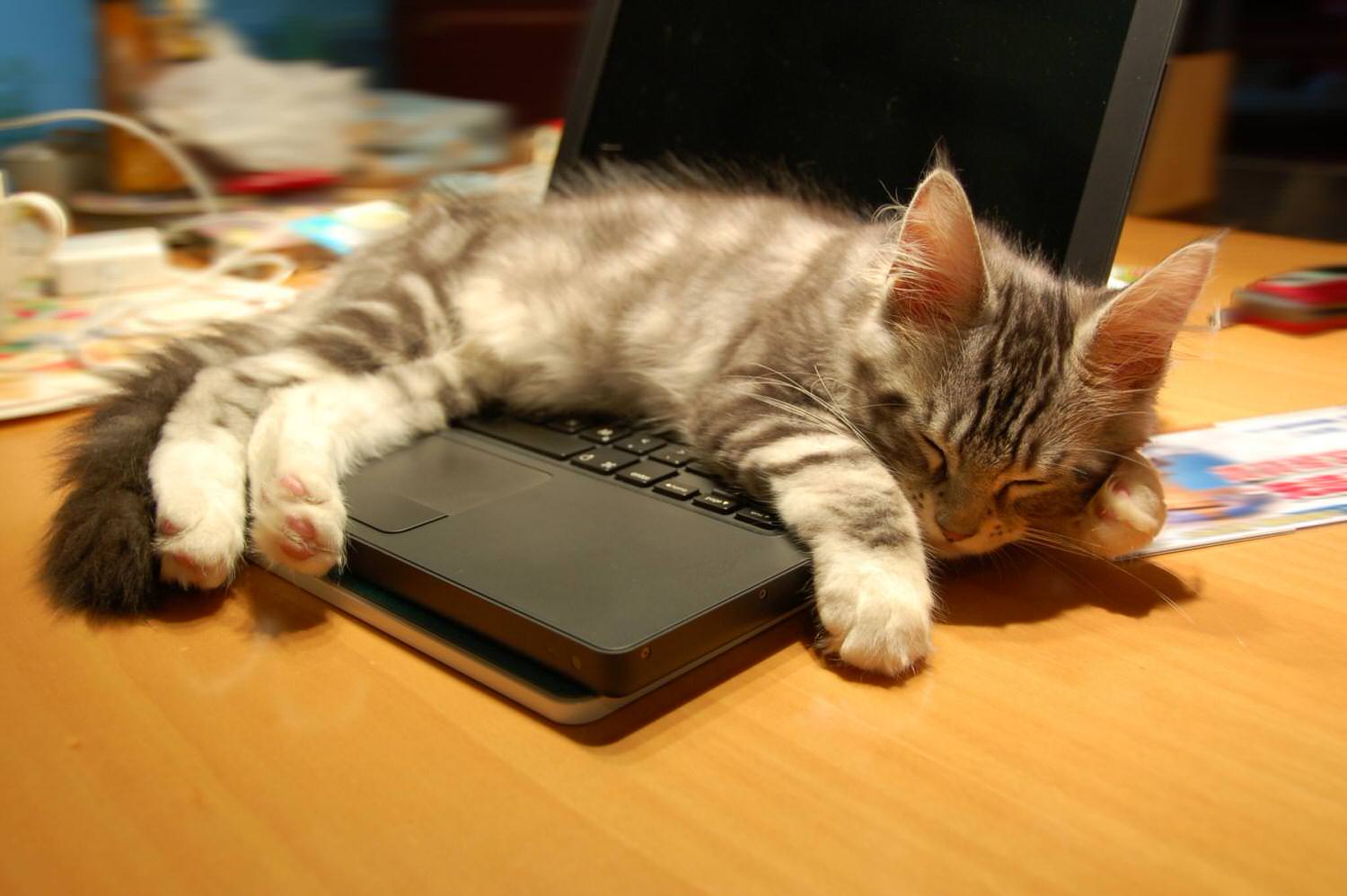我承認,在學生時代養成的”夜貓子”生活習慣,到現在還無法完全改過來,一部份也是因為哄小孩睡覺之後,才有自己的時間,這麼寶貴的時段,往往不想太早結束,所以就弄到蠻晚才睡的,結果今天看到這一篇研究報導,著實讓人心生警惕……
2015年4月1日韓國的研究,發表在The Journal of Clinical Endocrinology & Metabolism,在前言中,就已經提到幾個關於夜貓子的研究,會如何影響健康:
1. 夜貓子的睡眠時間通常比較短,早上還沒到生理時鐘該起床的時候,就因為得上班,而縮短了生理所需求的睡眠時間。
2. 而睡眠時間較短,容易導致肥胖、以及糖尿病的發生。
3. 再者,睡眠時間縮短,容易使糖尿病患者的血糖控制變差。
4. 夜貓子的生活型態,得到糖尿病的機會升高為2.5倍。
因此,他們找了1620個中年人,年紀在47-59歲之間,先發問卷問他們:幾點會覺得累、幾點起床、幾點是你覺得最有精神的時候,把他們分成:夜貓族、早睡一族、以及不特別早或晚的族群。結果發現夜貓族會……:
1. 三酸甘油脂(triglyceride)比較高。
2. 發炎指數(hsCRP)比較高。
3. 體脂肪比較多。
4. 男性的糖尿病風險,升高為約3倍 [OR:2.98 (95% CI, 1.39 – 6.39)]。
5. 女性的代謝症候群風險,升高為約4倍 [OR:3.89 (95% CI, 1.33–11.33)]。
所以囉!早點睡吧,各位!
{2147300:T47U6N2I};{2147300:I46NBRAQ};{2147300:UQWE9JJC},{2147300:QIWPPMGI};{2147300:3KBGP6ZD};{2147300:9GE5GD78}pediatricsdefaultascno716
%7B%22status%22%3A%22success%22%2C%22updateneeded%22%3Afalse%2C%22instance%22%3A%22zotpress-fb69392c2ae46417c679414c4a2d0afd%22%2C%22meta%22%3A%7B%22request_last%22%3A0%2C%22request_next%22%3A0%2C%22used_cache%22%3Atrue%7D%2C%22data%22%3A%5B%7B%22key%22%3A%229GE5GD78%22%2C%22library%22%3A%7B%22id%22%3A2147300%7D%2C%22meta%22%3A%7B%22creatorSummary%22%3A%22Merikanto%20et%20al.%22%2C%22parsedDate%22%3A%222013-05%22%2C%22numChildren%22%3A1%7D%2C%22bib%22%3A%22%3Cdiv%20class%3D%5C%22csl-bib-body%5C%22%20style%3D%5C%22line-height%3A%201.35%3B%20%5C%22%3E%5Cn%20%20%3Cdiv%20class%3D%5C%22csl-entry%5C%22%20style%3D%5C%22clear%3A%20left%3B%20%5C%22%3E%5Cn%20%20%20%20%3Cdiv%20class%3D%5C%22csl-left-margin%5C%22%20style%3D%5C%22float%3A%20left%3B%20padding-right%3A%200.5em%3B%20text-align%3A%20right%3B%20width%3A%201em%3B%5C%22%3E1.%20%3C%5C%2Fdiv%3E%3Cdiv%20class%3D%5C%22csl-right-inline%5C%22%20style%3D%5C%22margin%3A%200%20.4em%200%201.5em%3B%5C%22%3EMerikanto%20I%2C%20Lahti%20T%2C%20Puolijoki%20H%2C%20et%20al.%20Associations%20of%20chronotype%20and%20sleep%20with%20cardiovascular%20diseases%20and%20type%202%20diabetes.%20%3Ci%3EChronobiol%20Int%3C%5C%2Fi%3E.%202013%3B30%284%29%3A470-477.%20%3Ca%20href%3D%27http%3A%5C%2F%5C%2Fdoi.org%5C%2F10.3109%5C%2F07420528.2012.741171%27%3Ehttp%3A%5C%2F%5C%2Fdoi.org%5C%2F10.3109%5C%2F07420528.2012.741171%3C%5C%2Fa%3E%3C%5C%2Fdiv%3E%5Cn%20%20%3C%5C%2Fdiv%3E%5Cn%3C%5C%2Fdiv%3E%22%2C%22data%22%3A%7B%22itemType%22%3A%22journalArticle%22%2C%22title%22%3A%22Associations%20of%20chronotype%20and%20sleep%20with%20cardiovascular%20diseases%20and%20type%202%20diabetes%22%2C%22creators%22%3A%5B%7B%22creatorType%22%3A%22author%22%2C%22firstName%22%3A%22Ilona%22%2C%22lastName%22%3A%22Merikanto%22%7D%2C%7B%22creatorType%22%3A%22author%22%2C%22firstName%22%3A%22Tuuli%22%2C%22lastName%22%3A%22Lahti%22%7D%2C%7B%22creatorType%22%3A%22author%22%2C%22firstName%22%3A%22Hannu%22%2C%22lastName%22%3A%22Puolijoki%22%7D%2C%7B%22creatorType%22%3A%22author%22%2C%22firstName%22%3A%22Mauno%22%2C%22lastName%22%3A%22Vanhala%22%7D%2C%7B%22creatorType%22%3A%22author%22%2C%22firstName%22%3A%22Markku%22%2C%22lastName%22%3A%22Peltonen%22%7D%2C%7B%22creatorType%22%3A%22author%22%2C%22firstName%22%3A%22Tiina%22%2C%22lastName%22%3A%22Laatikainen%22%7D%2C%7B%22creatorType%22%3A%22author%22%2C%22firstName%22%3A%22Erkki%22%2C%22lastName%22%3A%22Vartiainen%22%7D%2C%7B%22creatorType%22%3A%22author%22%2C%22firstName%22%3A%22Veikko%22%2C%22lastName%22%3A%22Salomaa%22%7D%2C%7B%22creatorType%22%3A%22author%22%2C%22firstName%22%3A%22Erkki%22%2C%22lastName%22%3A%22Kronholm%22%7D%2C%7B%22creatorType%22%3A%22author%22%2C%22firstName%22%3A%22Timo%22%2C%22lastName%22%3A%22Partonen%22%7D%5D%2C%22abstractNote%22%3A%22In%20this%20study%2C%20the%20authors%20analyzed%20whether%20chronotypes%2C%20sleep%20duration%2C%20and%20sleep%20sufficiency%20are%20associated%20with%20cardiovascular%20diseases%20and%20type%202%20diabetes%20by%20using%20the%20National%20FINRISK%20Study%202007%20data%20%28N%20%3D%206258%29%2C%20being%20a%20representative%20sample%20of%20the%20population%20aged%2025%20to%2074%20living%20in%20five%20areas%20of%20Finland.%20Health%20status%20assessments%20and%20laboratory%20measurements%20from%20the%20participants%20%28N%20%3D%204589%29%20of%20the%20DILGOM%20substudy%20were%20used%20for%20the%20detailed%20analysis%20of%20chronotype.%20Evening%20types%20had%20a%202.5-fold%20odds%20ratio%20for%20type%202%20diabetes%20%28p%20%3C%20.01%29%20as%20compared%20with%20morning%20types%2C%20the%20association%20being%20independent%20of%20sleep%20duration%20and%20sleep%20sufficiency.%20Evening%20types%20had%20a%201.3-fold%20odds%20ratio%20for%20arterial%20hypertension%20%28p%20%3C%20.05%20after%20controlling%20for%20sleep%20duration%20or%20sleep%20sufficiency%29%2C%20a%20faster%20resting%20heart%20rate%20and%20a%20lower%20systolic%20blood%20pressure%20%28both%20p%20%3C%20.01%29%2C%20and%20lower%20levels%20of%20serum%20total%20cholesterol%20and%20low-density%20lipoprotein%20cholesterol%20%28both%20p%20%3C%20.0001%29%20than%20morning%20types.%20There%20were%20significant%201.2-%20to%201.4-fold%20odds%20ratios%20for%20arterial%20hypertension%20among%20those%20with%20long%20or%20short%20sleep%20durations%20or%20reduced%20sleep%20sufficiency.%20To%20conclude%2C%20the%20behavioral%20trait%20towards%20eveningness%20is%20suggested%20to%20predispose%20individuals%20to%20type%202%20diabetes%20in%20particular%2C%20whereas%20compromised%20sleep%20is%20robustly%20associated%20with%20arterial%20hypertension.%22%2C%22date%22%3A%22May%202013%22%2C%22language%22%3A%22eng%22%2C%22DOI%22%3A%2210.3109%5C%2F07420528.2012.741171%22%2C%22ISSN%22%3A%221525-6073%22%2C%22url%22%3A%22%22%2C%22collections%22%3A%5B%5D%2C%22dateModified%22%3A%222015-04-02T07%3A42%3A25Z%22%7D%7D%2C%7B%22key%22%3A%22I46NBRAQ%22%2C%22library%22%3A%7B%22id%22%3A2147300%7D%2C%22meta%22%3A%7B%22creatorSummary%22%3A%22Merikanto%20et%20al.%22%2C%22parsedDate%22%3A%222012-04%22%2C%22numChildren%22%3A1%7D%2C%22bib%22%3A%22%3Cdiv%20class%3D%5C%22csl-bib-body%5C%22%20style%3D%5C%22line-height%3A%201.35%3B%20%5C%22%3E%5Cn%20%20%3Cdiv%20class%3D%5C%22csl-entry%5C%22%20style%3D%5C%22clear%3A%20left%3B%20%5C%22%3E%5Cn%20%20%20%20%3Cdiv%20class%3D%5C%22csl-left-margin%5C%22%20style%3D%5C%22float%3A%20left%3B%20padding-right%3A%200.5em%3B%20text-align%3A%20right%3B%20width%3A%201em%3B%5C%22%3E1.%20%3C%5C%2Fdiv%3E%3Cdiv%20class%3D%5C%22csl-right-inline%5C%22%20style%3D%5C%22margin%3A%200%20.4em%200%201.5em%3B%5C%22%3EMerikanto%20I%2C%20Kronholm%20E%2C%20Peltonen%20M%2C%20Laatikainen%20T%2C%20Lahti%20T%2C%20Partonen%20T.%20Relation%20of%20chronotype%20to%20sleep%20complaints%20in%20the%20general%20Finnish%20population.%20%3Ci%3EChronobiol%20Int%3C%5C%2Fi%3E.%202012%3B29%283%29%3A311-317.%20%3Ca%20href%3D%27http%3A%5C%2F%5C%2Fdoi.org%5C%2F10.3109%5C%2F07420528.2012.655870%27%3Ehttp%3A%5C%2F%5C%2Fdoi.org%5C%2F10.3109%5C%2F07420528.2012.655870%3C%5C%2Fa%3E%3C%5C%2Fdiv%3E%5Cn%20%20%3C%5C%2Fdiv%3E%5Cn%3C%5C%2Fdiv%3E%22%2C%22data%22%3A%7B%22itemType%22%3A%22journalArticle%22%2C%22title%22%3A%22Relation%20of%20chronotype%20to%20sleep%20complaints%20in%20the%20general%20Finnish%20population%22%2C%22creators%22%3A%5B%7B%22creatorType%22%3A%22author%22%2C%22firstName%22%3A%22Ilona%22%2C%22lastName%22%3A%22Merikanto%22%7D%2C%7B%22creatorType%22%3A%22author%22%2C%22firstName%22%3A%22Erkki%22%2C%22lastName%22%3A%22Kronholm%22%7D%2C%7B%22creatorType%22%3A%22author%22%2C%22firstName%22%3A%22Markku%22%2C%22lastName%22%3A%22Peltonen%22%7D%2C%7B%22creatorType%22%3A%22author%22%2C%22firstName%22%3A%22Tiina%22%2C%22lastName%22%3A%22Laatikainen%22%7D%2C%7B%22creatorType%22%3A%22author%22%2C%22firstName%22%3A%22Tuuli%22%2C%22lastName%22%3A%22Lahti%22%7D%2C%7B%22creatorType%22%3A%22author%22%2C%22firstName%22%3A%22Timo%22%2C%22lastName%22%3A%22Partonen%22%7D%5D%2C%22abstractNote%22%3A%22Individuals%20show%20variation%20in%20their%20preference%20for%20the%20daily%20timing%20of%20activities.%20In%20this%20study%20the%20authors%20analyzed%20whether%20chronotypes%20associate%20with%20sleep%20duration%20and%20sleep-related%20complaints.%20The%20authors%20used%20the%20National%20FINRISK%20Study%202007%20Survey%20data%20on%203696%20women%20and%203162%20men%2C%20representative%20of%20the%20Finnish%20population%20aged%2025%20yrs%20and%20older%2C%20for%20the%20assessment%20of%20chronotype%20and%20self-reported%20sleep.%20Evening%20types%20experienced%20insomnia%20symptoms%2C%20had%20nightmares%2C%20and%20had%20used%20recently%20hypnotics%20significantly%20more%20often%20than%20other%20chronotypes%20among%20both%20men%20and%20women.%20In%20a%20multinominal%20logistic%20regression%20model%20predicting%20insufficient%20sleep%2C%20the%20association%20of%20eveningness%20with%20insufficient%20sleep%20was%20not%20abolished%20after%20adjustment%20for%20sex%2C%20age%2C%20and%20sleep%20duration.%20The%20prevalence%20of%20short%20sleepers%20was%20significantly%20higher%20in%20evening%20types%20among%20men%20than%20among%20women%2C%20whereas%20that%20of%20long%20sleepers%20was%20significantly%20higher%20in%20evening%20types%20among%20both%20men%20and%20women%2C%20as%20compared%20with%20the%20other%20chronotypes.%20These%20results%20indicate%20that%20eveningness%20predisposes%20individuals%20to%20a%20range%20of%20sleep%20complaints.%22%2C%22date%22%3A%22Apr%202012%22%2C%22language%22%3A%22eng%22%2C%22DOI%22%3A%2210.3109%5C%2F07420528.2012.655870%22%2C%22ISSN%22%3A%221525-6073%22%2C%22url%22%3A%22%22%2C%22collections%22%3A%5B%5D%2C%22dateModified%22%3A%222015-04-02T07%3A42%3A19Z%22%7D%7D%2C%7B%22key%22%3A%223KBGP6ZD%22%2C%22library%22%3A%7B%22id%22%3A2147300%7D%2C%22meta%22%3A%7B%22creatorSummary%22%3A%22Reutrakul%20et%20al.%22%2C%22parsedDate%22%3A%222013-09%22%2C%22numChildren%22%3A1%7D%2C%22bib%22%3A%22%3Cdiv%20class%3D%5C%22csl-bib-body%5C%22%20style%3D%5C%22line-height%3A%201.35%3B%20%5C%22%3E%5Cn%20%20%3Cdiv%20class%3D%5C%22csl-entry%5C%22%20style%3D%5C%22clear%3A%20left%3B%20%5C%22%3E%5Cn%20%20%20%20%3Cdiv%20class%3D%5C%22csl-left-margin%5C%22%20style%3D%5C%22float%3A%20left%3B%20padding-right%3A%200.5em%3B%20text-align%3A%20right%3B%20width%3A%201em%3B%5C%22%3E1.%20%3C%5C%2Fdiv%3E%3Cdiv%20class%3D%5C%22csl-right-inline%5C%22%20style%3D%5C%22margin%3A%200%20.4em%200%201.5em%3B%5C%22%3EReutrakul%20S%2C%20Hood%20MM%2C%20Crowley%20SJ%2C%20et%20al.%20Chronotype%20is%20independently%20associated%20with%20glycemic%20control%20in%20type%202%20diabetes.%20%3Ci%3EDiabetes%20Care%3C%5C%2Fi%3E.%202013%3B36%289%29%3A2523-2529.%20%3Ca%20href%3D%27http%3A%5C%2F%5C%2Fdoi.org%5C%2F10.2337%5C%2Fdc12-2697%27%3Ehttp%3A%5C%2F%5C%2Fdoi.org%5C%2F10.2337%5C%2Fdc12-2697%3C%5C%2Fa%3E%3C%5C%2Fdiv%3E%5Cn%20%20%3C%5C%2Fdiv%3E%5Cn%3C%5C%2Fdiv%3E%22%2C%22data%22%3A%7B%22itemType%22%3A%22journalArticle%22%2C%22title%22%3A%22Chronotype%20is%20independently%20associated%20with%20glycemic%20control%20in%20type%202%20diabetes%22%2C%22creators%22%3A%5B%7B%22creatorType%22%3A%22author%22%2C%22firstName%22%3A%22Sirimon%22%2C%22lastName%22%3A%22Reutrakul%22%7D%2C%7B%22creatorType%22%3A%22author%22%2C%22firstName%22%3A%22Megan%20M.%22%2C%22lastName%22%3A%22Hood%22%7D%2C%7B%22creatorType%22%3A%22author%22%2C%22firstName%22%3A%22Stephanie%20J.%22%2C%22lastName%22%3A%22Crowley%22%7D%2C%7B%22creatorType%22%3A%22author%22%2C%22firstName%22%3A%22Mary%20K.%22%2C%22lastName%22%3A%22Morgan%22%7D%2C%7B%22creatorType%22%3A%22author%22%2C%22firstName%22%3A%22Marsha%22%2C%22lastName%22%3A%22Teodori%22%7D%2C%7B%22creatorType%22%3A%22author%22%2C%22firstName%22%3A%22Kristen%20L.%22%2C%22lastName%22%3A%22Knutson%22%7D%2C%7B%22creatorType%22%3A%22author%22%2C%22firstName%22%3A%22Eve%22%2C%22lastName%22%3A%22Van%20Cauter%22%7D%5D%2C%22abstractNote%22%3A%22OBJECTIVE%3A%20To%20examine%20whether%20chronotype%20and%20daily%20caloric%20distribution%20are%20associated%20with%20glycemic%20control%20in%20patients%20with%20type%202%20diabetes%20independently%20of%20sleep%20disturbances.%5CnRESEARCH%20DESIGN%20AND%20METHODS%3A%20Patients%20with%20type%202%20diabetes%20had%20a%20structured%20interview%20and%20completed%20questionnaires%20to%20collect%20information%20on%20diabetes%20history%20and%20habitual%20sleep%20duration%2C%20quality%2C%20and%20timing.%20Shift%20workers%20were%20excluded.%20A%20recently%20validated%20construct%20derived%20from%20mid-sleep%20time%20on%20weekends%20was%20used%20as%20an%20indicator%20of%20chronotype.%20One-day%20food%20recall%20was%20used%20to%20compute%20the%20temporal%20distribution%20of%20caloric%20intake.%20Hierarchical%20linear%20regression%20analyses%20controlling%20for%20demographic%20and%20sleep%20variables%20were%20computed%20to%20determine%20whether%20chronotype%20was%20associated%20with%20HbA1c%20values%20and%20whether%20this%20association%20was%20mediated%20by%20a%20higher%20proportion%20of%20caloric%20intake%20at%20dinner.%5CnRESULTS%3A%20We%20analyzed%20194%20completed%20questionnaires.%20Multiple%20regression%20analyses%20adjusting%20for%20age%2C%20sex%2C%20race%2C%20BMI%2C%20insulin%20use%2C%20depressed%20mood%2C%20diabetes%20complications%2C%20and%20perceived%20sleep%20debt%20found%20that%20chronotype%20was%20significantly%20associated%20with%20glycemic%20control%20%28P%20%3D%200.001%29.%20This%20association%20was%20partially%20mediated%20by%20a%20greater%20percentage%20of%20total%20daily%20calories%20consumed%20at%20dinner.%5CnCONCLUSIONS%3A%20Later%20chronotype%20and%20larger%20dinner%20were%20associated%20with%20poorer%20glycemic%20control%20in%20patients%20with%20type%202%20diabetes%20independently%20of%20sleep%20disturbances.%20These%20results%20suggest%20that%20chronotype%20may%20be%20predictive%20of%20disease%20outcomes%20and%20lend%20further%20support%20to%20the%20role%20of%20the%20circadian%20system%20in%20metabolic%20regulation.%22%2C%22date%22%3A%22Sep%202013%22%2C%22language%22%3A%22eng%22%2C%22DOI%22%3A%2210.2337%5C%2Fdc12-2697%22%2C%22ISSN%22%3A%221935-5548%22%2C%22url%22%3A%22%22%2C%22collections%22%3A%5B%5D%2C%22dateModified%22%3A%222015-04-02T07%3A40%3A45Z%22%7D%7D%2C%7B%22key%22%3A%22QIWPPMGI%22%2C%22library%22%3A%7B%22id%22%3A2147300%7D%2C%22meta%22%3A%7B%22creatorSummary%22%3A%22Kita%20et%20al.%22%2C%22parsedDate%22%3A%222012-02%22%2C%22numChildren%22%3A1%7D%2C%22bib%22%3A%22%3Cdiv%20class%3D%5C%22csl-bib-body%5C%22%20style%3D%5C%22line-height%3A%201.35%3B%20%5C%22%3E%5Cn%20%20%3Cdiv%20class%3D%5C%22csl-entry%5C%22%20style%3D%5C%22clear%3A%20left%3B%20%5C%22%3E%5Cn%20%20%20%20%3Cdiv%20class%3D%5C%22csl-left-margin%5C%22%20style%3D%5C%22float%3A%20left%3B%20padding-right%3A%200.5em%3B%20text-align%3A%20right%3B%20width%3A%201em%3B%5C%22%3E1.%20%3C%5C%2Fdiv%3E%3Cdiv%20class%3D%5C%22csl-right-inline%5C%22%20style%3D%5C%22margin%3A%200%20.4em%200%201.5em%3B%5C%22%3EKita%20T%2C%20Yoshioka%20E%2C%20Satoh%20H%2C%20et%20al.%20Short%20sleep%20duration%20and%20poor%20sleep%20quality%20increase%20the%20risk%20of%20diabetes%20in%20Japanese%20workers%20with%20no%20family%20history%20of%20diabetes.%20%3Ci%3EDiabetes%20Care%3C%5C%2Fi%3E.%202012%3B35%282%29%3A313-318.%20%3Ca%20href%3D%27http%3A%5C%2F%5C%2Fdoi.org%5C%2F10.2337%5C%2Fdc11-1455%27%3Ehttp%3A%5C%2F%5C%2Fdoi.org%5C%2F10.2337%5C%2Fdc11-1455%3C%5C%2Fa%3E%3C%5C%2Fdiv%3E%5Cn%20%20%3C%5C%2Fdiv%3E%5Cn%3C%5C%2Fdiv%3E%22%2C%22data%22%3A%7B%22itemType%22%3A%22journalArticle%22%2C%22title%22%3A%22Short%20sleep%20duration%20and%20poor%20sleep%20quality%20increase%20the%20risk%20of%20diabetes%20in%20Japanese%20workers%20with%20no%20family%20history%20of%20diabetes%22%2C%22creators%22%3A%5B%7B%22creatorType%22%3A%22author%22%2C%22firstName%22%3A%22Toshiko%22%2C%22lastName%22%3A%22Kita%22%7D%2C%7B%22creatorType%22%3A%22author%22%2C%22firstName%22%3A%22Eiji%22%2C%22lastName%22%3A%22Yoshioka%22%7D%2C%7B%22creatorType%22%3A%22author%22%2C%22firstName%22%3A%22Hiroki%22%2C%22lastName%22%3A%22Satoh%22%7D%2C%7B%22creatorType%22%3A%22author%22%2C%22firstName%22%3A%22Yasuaki%22%2C%22lastName%22%3A%22Saijo%22%7D%2C%7B%22creatorType%22%3A%22author%22%2C%22firstName%22%3A%22Mariko%22%2C%22lastName%22%3A%22Kawaharada%22%7D%2C%7B%22creatorType%22%3A%22author%22%2C%22firstName%22%3A%22Eisaku%22%2C%22lastName%22%3A%22Okada%22%7D%2C%7B%22creatorType%22%3A%22author%22%2C%22firstName%22%3A%22Reiko%22%2C%22lastName%22%3A%22Kishi%22%7D%5D%2C%22abstractNote%22%3A%22OBJECTIVE%3A%20To%20investigate%20whether%20a%20difference%20in%20the%20risk%20for%20diabetes%20exists%20in%20Japanese%20workers%20with%20regard%20to%20sleep%20duration%5C%2Fquality%20and%20the%20presence%20or%20absence%20of%20a%20family%20history%20of%20diabetes%20%28FHD%29.%5CnRESEARCH%20DESIGN%20AND%20METHODS%3A%20The%20researchers%20conducted%20a%20prospective%2C%20occupational-based%20study%20of%20local%20government%20employees%20in%20Sapporo%2C%20Japan.%20Between%20April%202003%20and%20March%202004%2C%203%2C570%20nondiabetic%20participants%2C%20aged%2035-55%20years%2C%20underwent%20annual%20health%20checkups%20and%20completed%20a%20self-administered%20questionnaire%20that%20included%20information%20on%20sleep%20duration%5C%2Fquality%20and%20FHD%20at%20baseline.%20Having%20diabetes%20was%20defined%20as%20taking%20medication%20for%20diabetes%20or%20a%20fasting%20plasma%20glucose%20level%20of%20%5Cu2265126%20mg%5C%2FdL%20at%20follow-up%20%282007-2008%29.%5CnRESULTS%3A%20A%20total%20of%20121%20%283.4%25%29%20new%20cases%20of%20diabetes%20were%20reported.%20In%20multivariate%20logistic%20regression%20models%20of%20workers%20without%20an%20FHD%2C%20and%20after%20adjustment%20for%20potential%20confounding%20factors%2C%20the%20odds%20ratio%20%2895%25%20CI%29%20for%20developing%20diabetes%20was%205.37%20%281.38-20.91%29%20in%20those%20with%20a%20sleep%20duration%20of%20%5Cu22645%20h%20compared%20with%20those%20with%20a%20sleep%20duration%20of%20%3E7%20h.%20Other%20risk%20factors%20were%20awakening%20during%20the%20night%20%285.03%20%5B1.43-17.64%5D%29%2C%20self-perceived%20insufficient%20sleep%20duration%20%286.76%20%5B2.09-21.87%5D%29%2C%20and%20unsatisfactory%20overall%20quality%20of%20sleep%20%283.71%20%5B1.37-10.07%5D%29.%20In%20subjects%20with%20an%20FHD%2C%20these%20associations%20were%20either%20absent%20or%20weaker.%5CnCONCLUSIONS%3A%20The%20current%20study%20shows%20that%20poor%20sleep%20is%20associated%20with%20a%20higher%20risk%20of%20developing%20diabetes%20in%20workers%20without%20an%20FHD.%20Promoting%20healthy%20sleeping%20habits%20may%20be%20effective%20for%20preventing%20the%20development%20of%20diabetes%20in%20people%20without%20an%20FHD.%22%2C%22date%22%3A%22Feb%202012%22%2C%22language%22%3A%22eng%22%2C%22DOI%22%3A%2210.2337%5C%2Fdc11-1455%22%2C%22ISSN%22%3A%221935-5548%22%2C%22url%22%3A%22%22%2C%22collections%22%3A%5B%5D%2C%22dateModified%22%3A%222015-04-02T07%3A39%3A58Z%22%7D%7D%2C%7B%22key%22%3A%22UQWE9JJC%22%2C%22library%22%3A%7B%22id%22%3A2147300%7D%2C%22meta%22%3A%7B%22creatorSummary%22%3A%22Cappuccio%20et%20al.%22%2C%22parsedDate%22%3A%222008-05-01%22%2C%22numChildren%22%3A2%7D%2C%22bib%22%3A%22%3Cdiv%20class%3D%5C%22csl-bib-body%5C%22%20style%3D%5C%22line-height%3A%201.35%3B%20%5C%22%3E%5Cn%20%20%3Cdiv%20class%3D%5C%22csl-entry%5C%22%20style%3D%5C%22clear%3A%20left%3B%20%5C%22%3E%5Cn%20%20%20%20%3Cdiv%20class%3D%5C%22csl-left-margin%5C%22%20style%3D%5C%22float%3A%20left%3B%20padding-right%3A%200.5em%3B%20text-align%3A%20right%3B%20width%3A%201em%3B%5C%22%3E1.%20%3C%5C%2Fdiv%3E%3Cdiv%20class%3D%5C%22csl-right-inline%5C%22%20style%3D%5C%22margin%3A%200%20.4em%200%201.5em%3B%5C%22%3ECappuccio%20FP%2C%20Taggart%20FM%2C%20Kandala%20NB%2C%20et%20al.%20Meta-Analysis%20of%20Short%20Sleep%20Duration%20and%20Obesity%20in%20Children%20and%20Adults.%20%3Ci%3ESleep%3C%5C%2Fi%3E.%202008%3B31%285%29%3A619-626.%20Accessed%20April%202%2C%202015.%20%3Ca%20href%3D%27http%3A%5C%2F%5C%2Fwww.ncbi.nlm.nih.gov%5C%2Fpmc%5C%2Farticles%5C%2FPMC2398753%5C%2F%27%3Ehttp%3A%5C%2F%5C%2Fwww.ncbi.nlm.nih.gov%5C%2Fpmc%5C%2Farticles%5C%2FPMC2398753%5C%2F%3C%5C%2Fa%3E%3C%5C%2Fdiv%3E%5Cn%20%20%3C%5C%2Fdiv%3E%5Cn%3C%5C%2Fdiv%3E%22%2C%22data%22%3A%7B%22itemType%22%3A%22journalArticle%22%2C%22title%22%3A%22Meta-Analysis%20of%20Short%20Sleep%20Duration%20and%20Obesity%20in%20Children%20and%20Adults%22%2C%22creators%22%3A%5B%7B%22creatorType%22%3A%22author%22%2C%22firstName%22%3A%22Francesco%20P.%22%2C%22lastName%22%3A%22Cappuccio%22%7D%2C%7B%22creatorType%22%3A%22author%22%2C%22firstName%22%3A%22Frances%20M.%22%2C%22lastName%22%3A%22Taggart%22%7D%2C%7B%22creatorType%22%3A%22author%22%2C%22firstName%22%3A%22Ngianga-Bakwin%22%2C%22lastName%22%3A%22Kandala%22%7D%2C%7B%22creatorType%22%3A%22author%22%2C%22firstName%22%3A%22Andrew%22%2C%22lastName%22%3A%22Currie%22%7D%2C%7B%22creatorType%22%3A%22author%22%2C%22firstName%22%3A%22Ed%22%2C%22lastName%22%3A%22Peile%22%7D%2C%7B%22creatorType%22%3A%22author%22%2C%22firstName%22%3A%22Saverio%22%2C%22lastName%22%3A%22Stranges%22%7D%2C%7B%22creatorType%22%3A%22author%22%2C%22firstName%22%3A%22Michelle%20A.%22%2C%22lastName%22%3A%22Miller%22%7D%5D%2C%22abstractNote%22%3A%22Background%3A%5CnRecent%20epidemiological%20studies%20suggest%20that%20short%20sleep%20duration%20may%20be%20associated%20with%20the%20development%20of%20obesity%20from%20childhood%20to%20adulthood.%5Cn%5CnObjectives%3A%5CnTo%20assess%20whether%20the%20evidence%20supports%20the%20presence%20of%20a%20relationship%20between%20short%20sleep%20duration%20and%20obesity%20at%20different%20ages%2C%20and%20to%20obtain%20an%20estimate%20of%20the%20risk.%5Cn%5CnMethods%3A%5CnWe%20performed%20a%20systematic%20search%20of%20publications%20using%20MEDLINE%20%281996-2007%20wk%2040%29%2C%20EMBASE%20%28from%201988%29%2C%20AMED%20%28from%201985%29%2C%20CINHAL%20%28from%201982%29%20and%20PsycINFO%20%28from%201985%29%20and%20manual%20searches%20without%20language%20restrictions.%20When%20necessary%2C%20authors%20were%20contacted.%20Criteria%20for%20inclusion%20were%3A%20report%20of%20duration%20of%20sleep%20as%20exposure%2C%20BMI%20as%20continuous%20outcome%20and%20prevalence%20of%20obesity%20as%20categorical%20outcome%2C%20number%20of%20participants%2C%20age%2C%20and%20gender.%20Results%20were%20pooled%20using%20a%20random%20effect%20model.%20Sensitivity%20analysis%20was%20performed%2C%20heterogeneity%20and%20publication%20bias%20were%20also%20checked.%20Results%20are%20expressed%20as%20pooled%20odds%20ratios%20%28OR%20%5B95%25%20confidence%20intervals%2C%20CIs%5D%29%20and%20as%20pooled%20regression%20coefficients%20%28%5Cu03b2%3B%2095%25%20CIs%29.%5Cn%5CnResults%3A%5CnOf%20696%20studies%20identified%2C%2045%20met%20the%20inclusion%20criteria%20%2819%20in%20children%20and%2026%20in%20adults%29%20and%2030%20%2812%20and%2018%2C%20respectively%29%20were%20pooled%20in%20the%20meta-analysis%20for%20a%20total%20of%2036%20population%20samples.%20They%20included%20634%2C511%20participants%20%2830%2C002%20children%20and%20604%2C509%20adults%29%20from%20around%20the%20world.%20Age%20ranged%20from%202%20to%20102%20years%20and%20included%20boys%2C%20girls%2C%20men%20and%20women.%20In%20children%20the%20pooled%20OR%20for%20short%20duration%20of%20sleep%20and%20obesity%20was%201.89%20%281.46%20to%202.43%3B%20P%20%3C%200.0001%29.%20In%20adults%20the%20pooled%20OR%20was%201.55%20%281.43%20to%201.68%3B%20P%20%3C%200.0001%29.%20There%20was%20no%20evidence%20of%20publication%20bias.%20In%20adults%2C%20the%20pooled%20%5Cu03b2%20for%20short%20sleep%20duration%20was%20%5Cu22120.35%20%28%5Cu22120.57%20to%20%5Cu22120.12%29%20unit%20change%20in%20BMI%20per%20hour%20of%20sleep%20change.%5Cn%5CnConclusions%3A%5CnCross-sectional%20studies%20from%20around%20the%20world%20show%20a%20consistent%20increased%20risk%20of%20obesity%20amongst%20short%20sleepers%20in%20children%20and%20adults.%20Causal%20inference%20is%20difficult%20due%20to%20lack%20of%20control%20for%20important%20confounders%20and%20inconsistent%20evidence%20of%20temporal%20sequence%20in%20prospective%20studies.%5Cn%5CnCitation%3A%5CnCappuccio%20FP%3B%20Taggart%20FM%3B%20Kandala%20NB%3B%20Currie%20A%3B%20Peile%20E%3B%20Stranges%20S%3B%20Miller%20MA.%20Meta-analysis%20of%20short%20sleep%20duration%20and%20obesity%20in%20children%20and%20adults.%20SLEEP%202008%3B31%285%29%3A619-626.%22%2C%22date%22%3A%222008-5-1%22%2C%22language%22%3A%22%22%2C%22DOI%22%3A%22%22%2C%22ISSN%22%3A%220161-8105%22%2C%22url%22%3A%22http%3A%5C%2F%5C%2Fwww.ncbi.nlm.nih.gov%5C%2Fpmc%5C%2Farticles%5C%2FPMC2398753%5C%2F%22%2C%22collections%22%3A%5B%5D%2C%22dateModified%22%3A%222015-04-02T07%3A39%3A40Z%22%7D%7D%2C%7B%22key%22%3A%22T47U6N2I%22%2C%22library%22%3A%7B%22id%22%3A2147300%7D%2C%22meta%22%3A%7B%22creatorSummary%22%3A%22Yu%20et%20al.%22%2C%22parsedDate%22%3A%222015%22%2C%22numChildren%22%3A0%7D%2C%22bib%22%3A%22%3Cdiv%20class%3D%5C%22csl-bib-body%5C%22%20style%3D%5C%22line-height%3A%201.35%3B%20%5C%22%3E%5Cn%20%20%3Cdiv%20class%3D%5C%22csl-entry%5C%22%20style%3D%5C%22clear%3A%20left%3B%20%5C%22%3E%5Cn%20%20%20%20%3Cdiv%20class%3D%5C%22csl-left-margin%5C%22%20style%3D%5C%22float%3A%20left%3B%20padding-right%3A%200.5em%3B%20text-align%3A%20right%3B%20width%3A%201em%3B%5C%22%3E1.%20%3C%5C%2Fdiv%3E%3Cdiv%20class%3D%5C%22csl-right-inline%5C%22%20style%3D%5C%22margin%3A%200%20.4em%200%201.5em%3B%5C%22%3EYu%20JH%2C%20Yun%20CH%2C%20Ahn%20JH%2C%20et%20al.%20Evening%20Chronotype%20Is%20Associated%20With%20Metabolic%20Disorders%20and%20Body%20Composition%20in%20Middle-Aged%20Adults.%20%3Ci%3EThe%20Journal%20of%20Clinical%20Endocrinology%20%26amp%3B%20Metabolism%3C%5C%2Fi%3E.%20Published%20online%202015%3Ajc.2014-3754.%20%3Ca%20href%3D%27http%3A%5C%2F%5C%2Fdoi.org%5C%2F10.1210%5C%2Fjc.2014-3754%27%3Ehttp%3A%5C%2F%5C%2Fdoi.org%5C%2F10.1210%5C%2Fjc.2014-3754%3C%5C%2Fa%3E%3C%5C%2Fdiv%3E%5Cn%20%20%3C%5C%2Fdiv%3E%5Cn%3C%5C%2Fdiv%3E%22%2C%22data%22%3A%7B%22itemType%22%3A%22journalArticle%22%2C%22title%22%3A%22Evening%20Chronotype%20Is%20Associated%20With%20Metabolic%20Disorders%20and%20Body%20Composition%20in%20Middle-Aged%20Adults%22%2C%22creators%22%3A%5B%7B%22creatorType%22%3A%22author%22%2C%22firstName%22%3A%22Ji%20Hee%22%2C%22lastName%22%3A%22Yu%22%7D%2C%7B%22creatorType%22%3A%22author%22%2C%22firstName%22%3A%22Chang-Ho%22%2C%22lastName%22%3A%22Yun%22%7D%2C%7B%22creatorType%22%3A%22author%22%2C%22firstName%22%3A%22Jae%20Hee%22%2C%22lastName%22%3A%22Ahn%22%7D%2C%7B%22creatorType%22%3A%22author%22%2C%22firstName%22%3A%22Sooyeon%22%2C%22lastName%22%3A%22Suh%22%7D%2C%7B%22creatorType%22%3A%22author%22%2C%22firstName%22%3A%22Hyun%20Joo%22%2C%22lastName%22%3A%22Cho%22%7D%2C%7B%22creatorType%22%3A%22author%22%2C%22firstName%22%3A%22Seung%20Ku%22%2C%22lastName%22%3A%22Lee%22%7D%2C%7B%22creatorType%22%3A%22author%22%2C%22firstName%22%3A%22Hye%20Jin%22%2C%22lastName%22%3A%22Yoo%22%7D%2C%7B%22creatorType%22%3A%22author%22%2C%22firstName%22%3A%22Ji%20A%22%2C%22lastName%22%3A%22Seo%22%7D%2C%7B%22creatorType%22%3A%22author%22%2C%22firstName%22%3A%22Sin%20Gon%22%2C%22lastName%22%3A%22Kim%22%7D%2C%7B%22creatorType%22%3A%22author%22%2C%22firstName%22%3A%22Kyung%20Mook%22%2C%22lastName%22%3A%22Choi%22%7D%2C%7B%22creatorType%22%3A%22author%22%2C%22firstName%22%3A%22Sei%20Hyun%22%2C%22lastName%22%3A%22Baik%22%7D%2C%7B%22creatorType%22%3A%22author%22%2C%22firstName%22%3A%22Dong%20Seop%22%2C%22lastName%22%3A%22Choi%22%7D%2C%7B%22creatorType%22%3A%22author%22%2C%22firstName%22%3A%22Chol%22%2C%22lastName%22%3A%22Shin%22%7D%2C%7B%22creatorType%22%3A%22author%22%2C%22firstName%22%3A%22Nan%20Hee%22%2C%22lastName%22%3A%22Kim%22%7D%5D%2C%22abstractNote%22%3A%22%22%2C%22date%22%3A%2204%5C%2F2015%22%2C%22language%22%3A%22en%22%2C%22DOI%22%3A%2210.1210%5C%2Fjc.2014-3754%22%2C%22ISSN%22%3A%220021-972X%2C%201945-7197%22%2C%22url%22%3A%22http%3A%5C%2F%5C%2Fpress.endocrine.org%5C%2Fdoi%5C%2F10.1210%5C%2Fjc.2014-3754%22%2C%22collections%22%3A%5B%5D%2C%22dateModified%22%3A%222015-04-02T07%3A15%3A24Z%22%7D%7D%5D%7D
1.
Merikanto I, Lahti T, Puolijoki H, et al. Associations of chronotype and sleep with cardiovascular diseases and type 2 diabetes. Chronobiol Int. 2013;30(4):470-477. http://doi.org/10.3109/07420528.2012.741171
1.
Merikanto I, Kronholm E, Peltonen M, Laatikainen T, Lahti T, Partonen T. Relation of chronotype to sleep complaints in the general Finnish population. Chronobiol Int. 2012;29(3):311-317. http://doi.org/10.3109/07420528.2012.655870
1.
Reutrakul S, Hood MM, Crowley SJ, et al. Chronotype is independently associated with glycemic control in type 2 diabetes. Diabetes Care. 2013;36(9):2523-2529. http://doi.org/10.2337/dc12-2697
1.
Kita T, Yoshioka E, Satoh H, et al. Short sleep duration and poor sleep quality increase the risk of diabetes in Japanese workers with no family history of diabetes. Diabetes Care. 2012;35(2):313-318. http://doi.org/10.2337/dc11-1455
1.
Cappuccio FP, Taggart FM, Kandala NB, et al. Meta-Analysis of Short Sleep Duration and Obesity in Children and Adults. Sleep. 2008;31(5):619-626. Accessed April 2, 2015. http://www.ncbi.nlm.nih.gov/pmc/articles/PMC2398753/
1.
Yu JH, Yun CH, Ahn JH, et al. Evening Chronotype Is Associated With Metabolic Disorders and Body Composition in Middle-Aged Adults. The Journal of Clinical Endocrinology & Metabolism. Published online 2015:jc.2014-3754. http://doi.org/10.1210/jc.2014-3754



